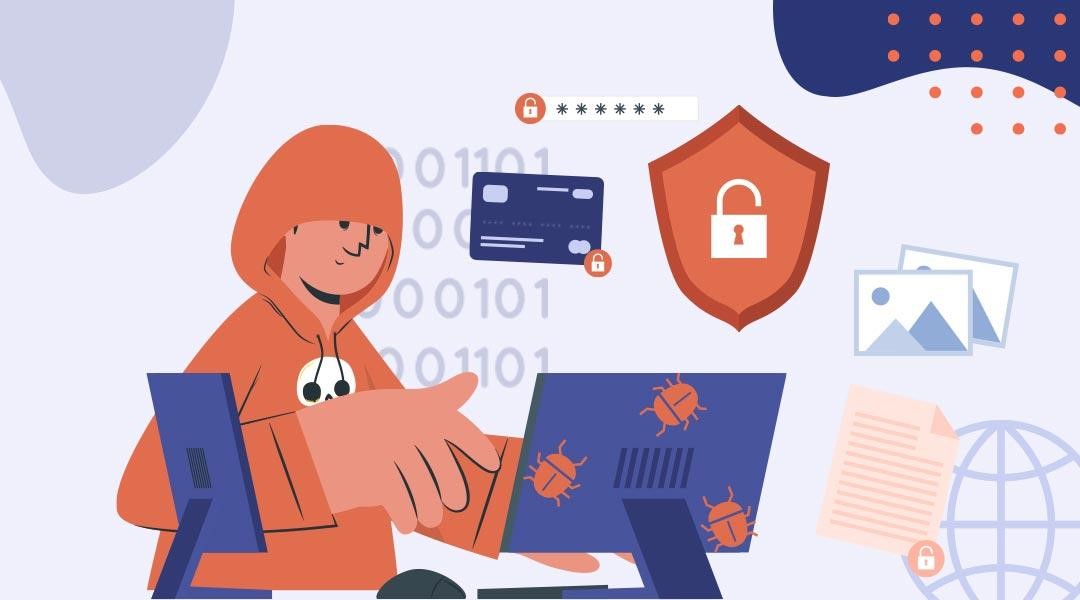Dictionary Attack (And Why You Need to Take it Seriously)

Are your online accounts and sensitive information truly secure? You might think so; after all, you diligently password-protect all your accounts and are careful who you share them with. But there’s a growing threat lurking in the shadows of the digital world. Dictionary attacks are an emerging cyber menace that is on the rise. They’re targeting both individuals and organizations, and you could be at risk too.
Picture this: hackers trying to break into your accounts by repeatedly guessing passwords, but with a cunning twist. Instead of randomly guessing combinations, they use an approach known as a dictionary attack. They rely on lists of commonly used words, phrases, and predictable patterns. Sneaky, right? This tactic exploits the human tendency to choose weak passwords or reuse them across various platforms. And that’s precisely why dictionary attacks are an alarmingly effective technique used by cybercriminals to gain unauthorized access to your personal and corporate accounts.
In this article, we’ll delve into the complex world of dictionary attacks and their dark secrets. Brace yourself for an eye-opening exploration of the risks they pose to both everyday folks and big corporations. But fear not, we’re also here to equip you with practical knowledge and effective countermeasures to fortify your defenses and protect yourself against the threat.
Table of Contents
ToggleUnderstanding Dictionary Attacks
What are dictionary attacks?
Dictionary attacks refer to a specific method of cyber assault used by hackers. In simple terms, a dictionary attack is like a persistent password guesser on steroids. It uses a systematic approach to crack passwords by tirelessly trying out a multitude of common words, along with their simple variations, until it finds the right combination.
But how do they actually work?
It’s all about automation. What makes dictionary attacks so effective is that hackers utilize software that does the heavy lifting for them. It tries out all the passwords from a pre-generated list of common words, phrases, and numeric combinations, one after another, until it finds the right one. By using automated software, hackers can systematically test these dictionaries against targeted accounts, hoping to strike gold.
Who is at risk?
From individuals to corporate accounts, dictionary attacks don’t discriminate against their victims. They can target any online account you can think of. Your email, social media, online banking, you name it. That’s why it’s essential to understand their reach and take action to protect yourself.

Risks and Implications
Falling victim to a dictionary attack isn’t just inconvenient; it can carry devastating consequences. It can affect your personal accounts, putting your privacy, finances, and online identity at stake. For organizations, the repercussions can be catastrophic, ranging from data breaches and compromised systems to reputational damage.
Your personal information at risk
Imagine for a moment that a dictionary attack manages to crack the password to your personal email or social media accounts. What information would they be able to get their hands on? Would they stumble upon your personal health records or banking information? Could they find the names and contact details of your friends and family? Or snoop through your private photos and messages? Chances are, for most individuals, it’s at least one of those sensitive pieces of information that would be exposed. The impact on your personal life from being hacked can be profound, causing immense stress, loss of privacy, and financial turmoil.
Guarding your finances
Now consider the nightmare of having your financial information compromised. Dictionary attacks can expose your credit card details, bank account credentials, and other sensitive financial data. Once in the hands of malicious actors, your hard-earned money becomes a target for fraudulent transactions, leading to financial losses, damaged credit, and a long and arduous journey to reclaim your financial stability.

Protecting your identity
Dictionary attacks are a gateway to online identity theft. With access to your accounts, hackers can easily impersonate you, ruining your online reputation and even causing harm to your personal and professional relationships. They can exploit your identity for malicious purposes, such as spreading false information, engaging in cyberbullying, or conducting fraudulent activities in your name. Rebuilding your digital identity and restoring trust can be an uphill battle, affecting your personal and professional life.
Using a reliable VPN is crucial for ensuring a secure online experience. They can offer enhanced protection and optimized performance. They also allow you to bypass geographical restrictions and access servers from anywhere worldwide. A VPN is specifically designed for gaming by providing optimized routes, reducing latency, and offering a more stable and secure connection by encrypting your internet traffic and routing it through secure servers.
Organizations can face major consequences
While being the victim of a dictionary attack on your personal accounts can be devastating, for businesses, the stakes are high. A successful attack can lead to severe data breaches, compromising sensitive customer information and exposing it to the public. The consequences include legal liabilities, financial penalties, and damage to the organization’s reputation, resulting in a loss of customer trust and potential revenue. Moreover, compromised systems can lead to operational disruptions, intellectual property theft, and confidential business information falling into the wrong hands.
For example, consider a scenario where a company decides to perform a data warehouse migration to cloud. During this process, employees are given temporary passwords to access the new system, but some employees opt for weak passwords or reuse passwords they’ve used on other platforms. By exploiting these weak passwords or reused ones, a hacker could successfully guess an employee’s login credentials and gain unauthorized access to the cloud-based customer database. They could then potentially access sensitive customer information and this data could be used for various malicious purposes, including identity theft or financial fraud.
Protecting sensitive data becomes even more critical when utilizing cloud storage solutions like Private Cloud Storage. Implementing strong authentication measures and encryption protocols for your cloud storage can add an extra layer of security against dictionary attacks and other cyber threats.
Common Techniques used in Dictionary Attacks
While traditional brute-force attacks systematically attempt every possible combination to try and discover your password, dictionary attacks take a different approach. Instead of exhausting all possibilities, dictionary attacks use a predetermined list of words and phrases. This technique reduces the chances of correctly guessing a complex password, but on the other hand, it makes dictionary attacks more efficient in terms of time and resources.
In a dictionary attack, the attacker also customizes the pre-determined dictionary list based on their target. For instance, if they were targeting an e-commerce website called “TechWorld”, the predefined list would include words and terms associated with the tech industry, popular technology brands, and relevant keywords. Examples could be “GadgetMaster,” “AppleFan123,” “TechEnthusiast,” or “CyberTech2023.”
Attackers use specialized tools that incorporate not only common passwords gathered from previous security breaches but also variations of certain words and phrases. An example of this would be substituting characters with symbols or numbers, such as replacing ‘a’ with ‘@’ or ‘o’ with ‘0’. This approach increases the chances of successfully cracking accounts with relatively weaker passwords.

Fighting Back Against Dictionary Attacks
If you’ve got this far, dictionary attacks likely sound like pretty scary stuff. But, don’t panic. There are effective steps you can take to protect yourself.
Let’s look at some precautions you can take to significantly reduce the risk of your accounts being targeted by dictionary attacks.
Create strong, unique passwords
Let’s start with the basics–using strong and unique passwords is crucial. Make a point of creating passwords that can’t be easily guessed. Firstly, the length of the password is important. Short passwords are easier to crack, so the longer, the better. Aim for a minimum of 12 characters.
Also, avoid using anything easily linked to your personal information, like your name or birthday. You should also avoid common dictionary words since attackers can easily guess them. Don’t think that replacing a letter in a word, like “Passw0rd,” makes it secure. In reality, a dictionary attack could crack it within seconds.
Finally, it’s important to include a mix of characters. Your password should incorporate a combination of lowercase letters, uppercase letters, numbers, and symbols.
Don’t use the same password
Are you among the many individuals who fall into the trap of creating a password and then using it across various websites, services, and applications? You’re not alone–studies show that over a third of people commit the risky habit of reusing passwords across some or all of their online platforms.
While this practice might seem harmless and convenient to remember your passwords, it’s leaving you wide open to potential cyber-attacks. Try to use different passwords across your accounts.
Password management tools
The trouble is, many of us have numerous online accounts, making it difficult to create and remember different passwords for each one. To make things easier, consider using password management tools. They have the ability to generate strong passwords on your behalf and securely store them, so you don’t have to worry about memorizing them all.

Two-factor authentication
Two-factor authentication helps to strengthen your security against dictionary attacks. It adds an additional verification step after entering your password, such as face recognition or a one-time code sent to your phone. This means that even if an attacker manages to get your password, it’s much harder for them to access your accounts.
Regular password updates
Regularly updating your passwords is a simple yet effective way to stay one step ahead of attackers. You can also set policies that require users to change their passwords after a certain period.
Account lockouts and intrusion detection systems
To prevent dictionary attacks from gaining traction, consider implementing account lockout mechanisms. After a certain number of failed login attempts, the system automatically locks the account, making it difficult for attackers to keep trying. Additionally, you can invest in intrusion detection systems that can spot suspicious activities, such as multiple failed login attempts from different IP addresses. With these systems in place, you can quickly detect and respond to dictionary attacks, minimizing the potential damage.
Key Takeaways: Strengthening Password Security
Passwords can be vulnerable to attacks, so it’s crucial to use strong and unique ones for each online account. You can do this by creating passwords that are hard to guess and not reusing them.
Additionally, using password management tools, implementing two-factor authentication, regularly updating passwords, and using account lockouts and intrusion detection systems can greatly reduce the risk of dictionary attacks.
Remember to stay smart and keep your passwords secure to outsmart hackers and protect your data.


No comments were posted yet